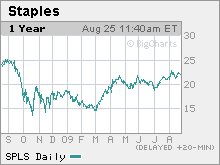Staples steps up
Sales are down, but the office supplies retailer is poised to shred the competition down the road.

| MMA | 0.69% |
| $10K MMA | 0.42% |
| 6 month CD | 0.94% |
| 1 yr CD | 1.49% |
| 5 yr CD | 1.93% |
NEW YORK (Fortune) -- Soaring unemployment and stagnant consumer spending have stalled at office-supply chain Staples, which reported a 38% decline in quarterly profit Tuesday morning.
But as any retail analyst will tell you these days, less bad is the new good -- and Staples (SPLS, Fortune 500), whose earnings matched the Street's expectations, has outperformed its peers during the recession.
"The market hasn't factored in the earnings power of this company in a recovery," says Brian Nagel, an analyst at Oppenheimer & Co. "Staples is a market share grabber."
Both of the retailer's main competitors have been struggling. Shares of Office Depot (ODP, Fortune 500) and OfficeMax (OMX, Fortune 500) dropped into dollar territory as they announce sales declines and store closings. Staples, on the other hand, has opened 41 stores so far this year; and last year, it shelled out $4.8 billion in 2008 for Corporate Express, the country's biggest direct-to-business office supplier.
"Staples is entering new markets where the competition has faltered," says Stacey Brodbar, an analyst at W.P. Stewart. "Despite the tough environment, they're strong enough to invest in their business."
Staples' same-store sales, or sales at stores open a year or more, have declined an average of 10% over the last twelve months, but that compares with a 17% drop at Office Depot and 13% at Office Max -- a sign that the chain is gaining share.
While Staples' retail and business-to-business sales fell last quarter, Nagel notes the declines did lessen. "Second-quarter earnings trends actually got a bit better for Staples," he says. "For the [competition], they had gotten worse."
A recent survey of office supply procurement officers conducted by Morgan Stanley sheds light on the company's competitive edge. According to the results, Staples received the highest scores in the industry on key metrics -- price to value, shipment accuracy, and customer service. 63% of its competitors' customers also shop at Staples, the highest proportion of cross-shoppers in the industry.
Customers prefer Staples because of the company's superior execution, says Matt Arnold, an analyst at Edward Jones. "A lot of their competitors use a model where the same people prospecting for clients are also the ones doing service," he says. "Staples has a team that finds customers, and another one focused on keeping them happy -- that's why they're sticky."
Analysts worry that discount retailers like Wal-Mart (WMT, Fortune 500) could steal some of Staples' growing market share, but Morgan Stanley's survey shows that corporate buyers still prefer Staples. "Online retailers, price clubs, and discounters only seem to matter for one-off purchases," wrote analyst Oliver Wintermantel.
Such loyalty from procurement officers benefits Staples' direct-to-business division, called North American Delivery. Staples beefed up that side of its business with its purchase of Corporate Express -- a wise move, says Arnold. "Their delivery business is more powerful than traditional retail because of the cost structure," he says. "The market isn't paying for that."
While most retailers' sales correlate with consumer spending, Staples' are equally tied to a recovery in corporate expenditures. Matthew Fassler, an analyst at Goldman Sachs, wrote in a recent note, "To the extent that the recovery in consumer spending is overshadowed by recovery in production, [office supply] stocks will likely find favor versus other retailers."
Goldman Sachs projects that, by June of next year, industrial production will be up 4.4% compared with a 1.2% increase in consumer spending. Fassler said he favors Staples over its competitors, noting that the company is a superior operator with better retail sales per square foot, operating margins, and returns on capital.
"Staples remains very well-positioned, as its superior execution, financial returns, and balance sheet give it far more control over its own destiny," he wrote.
Shares are trading at 18 times earnings, which is higher than average for the industry. But Nagel says it's unfair to compare Staples to its rivals. "They're clearly the better performer, so you have to consider the price relative to their own recovery prospects," he says. "On a longer term basis, I think Staples is undervalued." ![]()
-
 The retail giant tops the Fortune 500 for the second year in a row. Who else made the list? More
The retail giant tops the Fortune 500 for the second year in a row. Who else made the list? More -
 This group of companies is all about social networking to connect with their customers. More
This group of companies is all about social networking to connect with their customers. More -
 The fight over the cholesterol medication is keeping a generic version from hitting the market. More
The fight over the cholesterol medication is keeping a generic version from hitting the market. More -
 Bin Laden may be dead, but the terrorist group he led doesn't need his money. More
Bin Laden may be dead, but the terrorist group he led doesn't need his money. More -
 U.S. real estate might be a mess, but in other parts of the world, home prices are jumping. More
U.S. real estate might be a mess, but in other parts of the world, home prices are jumping. More -
 Libya's output is a fraction of global production, but it's crucial to the nation's economy. More
Libya's output is a fraction of global production, but it's crucial to the nation's economy. More -
 Once rates start to rise, things could get ugly fast for our neighbors to the north. More
Once rates start to rise, things could get ugly fast for our neighbors to the north. More








